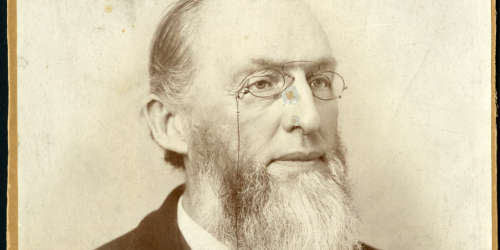
Uriah Smith. Source: Adventist Digital Library
Like Butler, Uriah Smith underwent a traumatic experience at the Minneapolis meetings. Deeply disappointed and upset by the session, he resigned from his long-held position as General Conference secretary in November 1888 but held on to the editorship of the Review.
He would maintain that post until 1897, sparring with A.T. Jones for much of the time about prophetic interpretation and other issues. His editorship during those years, however, was a downhill battle in the face of the popularity of the charismatic Jones who, by late 1892, had become the most listened-to ministerial voice in Adventism. In 1897 Smith received his ultimate humiliation when the denomination appointed Jones as Review editor with Smith as his associate.
Smith in the post-1888 years found it next to impossible to come to grips with the fact that Waggoner had preached the ten-commandment view of the law in Galatians and that Ellen White had backed Waggoner on the relation of law and gospel. For the next few years after the Minneapolis meetings, Smith would be a ringleader in casting doubt upon Ellen White’s work.
But she didn’t give up on him. She wrote him letter after letter calling for repentance, but to no avail. Then, in January 1891, he confessed his errors at Minneapolis. As Mrs. White put it: “He had fallen on the Rock and was broken.”
Smith’s falling on the Rock, however, did not mean that he was altogether on the Rock. His law-oriented theology still caused problems.
But in 1901 church leadership reappointed him as Review editor. Ellen White was overjoyed, expressing her pleasure that his name was once again at the “head of the list of editors: for thus it should be. . . . When, some years ago, his name was placed second (to Jones’), I felt hurt. When it was again placed first, I wept, and said, ‘Thank God’” (Lt 17, 1902).
But he still had some of the same old Smith left. Not long after he blame editor he reopened the Galatians war and again had to be sacked. He never recovered from the shock. The same Review that announced the change of editorship noted that he was seriously ill. He passed to his rest in 1903 at the age of 70.
Lord, help us this day with our willful selves. Help us to surrender all to You, even our most cherished ideas and ways.
George R. Knight is a retired professor of Church History at the Adventist Theological Seminary at Andrews University. This article is from his book, Lest We Forget, a daily devotional, published by the Review and Herald Publishing Association, page 298; reprinted by permission.